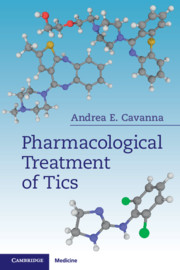Book contents
- Pharmacological Treatment of Tics
- Pharmacological Treatment of Tics
- Copyright page
- Dedication
- Contents
- Introduction: The Long and Winding Road to Tourette Syndrome
- Part I Diagnosis of Tics
- Part II Pharmacotherapy of Tics
- Part III Guidelines on the Pharmacotherapy of Tics
- Chapter 7 Guidelines Based on Systematic Literature Review and Meta-analysis
- Chapter 8 Guidelines Based on Expert Survey and Consensus
- Further reading
- Index
Chapter 7 - Guidelines Based on Systematic Literature Review and Meta-analysis
from Part III - Guidelines on the Pharmacotherapy of Tics
Published online by Cambridge University Press: 16 August 2020
- Pharmacological Treatment of Tics
- Pharmacological Treatment of Tics
- Copyright page
- Dedication
- Contents
- Introduction: The Long and Winding Road to Tourette Syndrome
- Part I Diagnosis of Tics
- Part II Pharmacotherapy of Tics
- Part III Guidelines on the Pharmacotherapy of Tics
- Chapter 7 Guidelines Based on Systematic Literature Review and Meta-analysis
- Chapter 8 Guidelines Based on Expert Survey and Consensus
- Further reading
- Index
Summary
Over the last few decades, evidence-based medicine has established itself as a new paradigm for teaching and practising clinical medicine. Double-blind randomized controlled trials and high-quality observational studies have gradually replaced tradition, anecdote, and theoretical reasoning from basic sciences as sources of evidence to complement clinical expertise in order to fulfil patients’ needs. The development of disease-specific guidelines has arguably contributed to the process of making clinical practice more scientific and empirically grounded, resulting in safer, more consistent and more cost effective care. However the evidence-based paradigm has received criticism based on the argument that the emphasis on experimental evidence could devalue basic sciences and the tacit knowledge that accumulates with clinical experience. Moreover, it has been argued that the evidence-based movement arose primarily from a desire to standardize care, rather than individualizing it. Practising medicine according to the standards set out by guidelines could be seen as antithetical to practising according to clinical judgement: standardization can only identify best practices for an ‘average’ patient under ‘average’ conditions, whereas clinical judgement is by definition personal and seeks to decide what is best for a ‘specific’ patient at a ‘specific’ time.
Information
- Type
- Chapter
- Information
- Pharmacological Treatment of Tics , pp. 127 - 145Publisher: Cambridge University PressPrint publication year: 2020
